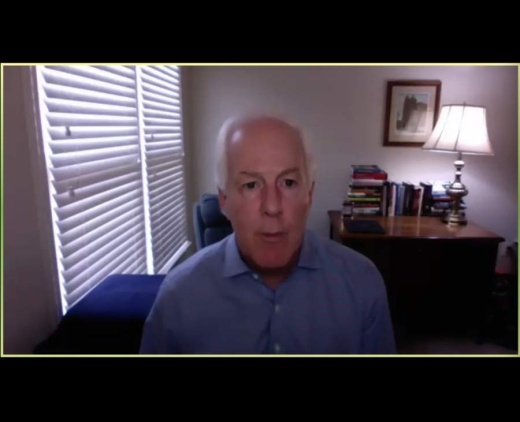Cornyn began his discussion by saying only a few months ago, he visited Dell Technologies in Round Rock and spoke with employees. In the weeks that have passed since, though, Cornyn said the world has changed drastically.
“It’s safe to say that the coronavirus has flipped our economy on its head," he said.
Cornyn said the nature of the coronavirus pandemic, acting as both a public health and an economic crisis, has been unprecedented. But Cornyn also said measures have been, and continue to be, taken by the federal government to assist small businesses and citizens alike.
Congress has passed four bills to help enhance resources, Cornyn said, beginning with health care providers and then assisting businesses and workers affected by the virus.
"We know that a lot of people are out of work, through no fault of their own, and the ones that I think the most about are the ones that work in the hospitality business," Cornyn said. "Maybe they worked for wages or tips or some combination, and now they have no money coming in the front door."
Financial assistance was provided to individuals from the federal government, with a $1,200 stimulus check provided to those making up to $75,000 annually and a $3,400 deposition for households making an income of $150,000 or less.
"As we're asking people to hunker down and not go to work and to engage in this mitigation strategy, we need to make sure that they have the money to actually pay or the necessities of life," Cornyn said.
For the unemployment insurance program, Cornyn said that was expanded to include eligibility for nonprofits and independent contractors, with an added federal benefit of $600 per week given. But one of the largest federal contributions, Cornyn said, has been the Paycheck Protection Program.
The PPP aims to incentivize employers to maintain their current payrolls and provides for eight weeks of cash flow assistance to small businesses with 500 employees or less. Cornyn said if employers are able to maintain payrolls through June, the payroll, rent and utility payments covered by the loan are forgiven, essentially turning into a grant.
The PPP began with $350 billion in funding and was depleted in two weeks, Cornyn said, and 135,000 loans were granted to small businesses, amounting to $28.5 billion.
Due to the heightened needs exhibited by small businesses, an additional $320 billion was added on top of the program's initial fund. Cornyn said the added funding came with additional provisions and oversight to ensure large companies and universities were not taking advantage of its resources.
Looking forward, Cornyn said the most pressing conversation centers around when the economy reopens. Gov. Greg Abbott's May 1 phased reopening for some businesses—such as retail shops, movie theaters and dine-in restaurants—at reduced capacity will be an area of much focus.
"The eyes of the nation will be on Texas," Cornyn said.
But reopening strategies are not one-size-fits-all quick fixes, Cornyn said. Local, state and national entities need to come together and determine what is the best way to reopen on a case-by-case basis, he added.
The experiences in New York do not exactly mirror those in Texas, just as the conditions in Taylor vary from those in Houston, he said.
"We don't want to have to do this twice, so we know we need to get it right first time," he said.
Following replenishments of the PPP, Cornyn said his objective is to see how the legislation passed so far works and where there may be holes needing to be filled. Feedback from business and community members, he said, is critical in determining what is needed and what the federal government can do to provide for those needs.
Jason Ball, the Round Rock Chamber's president and CEO, asked about state and local governments asking for support that has not been included in existing legislation.
"[Senate] Majority Leader [Mitch] McConnell has said that Congress should maybe press the pause button on any new aid like that," Ball said. "Do you anticipate that Congress might move to approve spending to support state and local governments, and has anything been talked about school districts?"
Cornyn responded Congress has designated $150 billion for state-level support, with Texas receiving $11.2 billion. Williamson County received more than $93 million in that support—an effortt Cornyn said he supports.
"I think what you heard from Sen. McConnell was he wants to pump the brakes here a little bit because we've already spent $2.5 trillion and it's been very quick," Cornyn said. "We want to make sure that what we've done so far gets to the intended beneficiaries."
Cornyn said if more help is needed, he is willing to have that conversation. Some states, Cornyn said, have struggled with unfunded pension problems and similar concerns, lending way to a larger discussion on some form of limits.
"I think we need to recognize there has to be some limit in terms of what the federal government can and should do to help those jurisdictions separate apart from the coronavirus," he said. "That's where I think that conversation is going to continue."
The final question during the Q&A session posed by an audience member regarded when there will be access to widespread testing for residents for both the coronavirus and antibodies to the virus.
Cornyn said consistent with recommendations from the Centers for Disease Control and Prevention, those who are symptomatic or have come into contact with a symptomatic person are top priority for testing. Out of more than 5 million tests available in the United States, Texas has had about 300,000 of those tests, he said.
Cornyn added there have been concerns on the reliability of testing, adding the most promising type has been the antibody tests. These reveal those who have been exposed to the coronavirus and have developed an immune response.
"What we need to do is ramp up in testing the different types of testing while we continue to pursue these clinical trials or a cure," Cornyn said. "Ultimately, the vaccine will allow us to more or less return to normal and treat this kind of in the same category as a seasonal flu."





